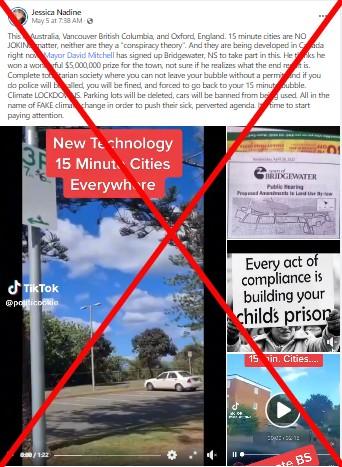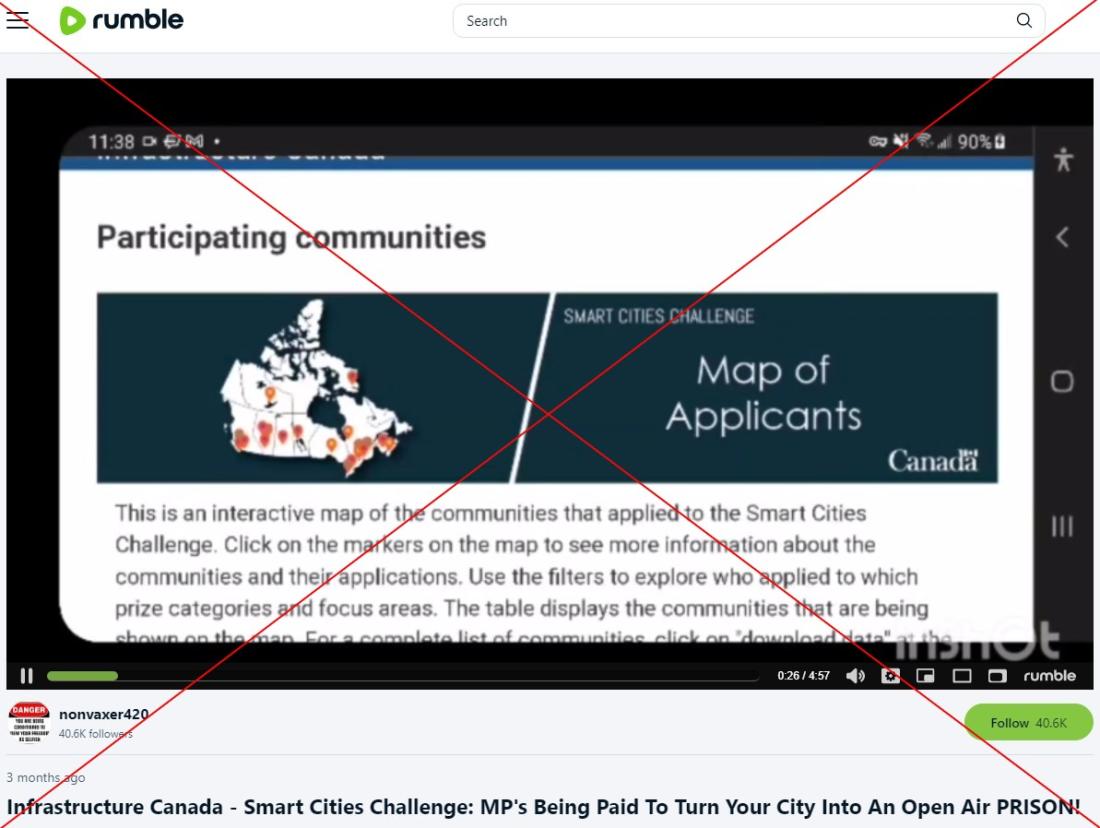
Nova Scotia town plagued by 15-minute city misinformation
- This article is more than two years old.
- Published on May 12, 2023 at 21:21
- 4 min read
- By Gwen Roley, AFP Canada
"15 minute cities are NO JOKING matter, neither are they a 'conspiracy theory,'" says a May 5, 2023 Facebook post. "Mayor David Mitchell has signed up Bridgewater, NS to take part in this. He thinks he won a wonderful $5,000,000 prize for the town, not sure if he realizes what the end result is. Complete totalitarian society where you can not leave your bubble without a permit."
The profile which shared the post has more than 5,700 followers and frequently claims that the town of Bridgewater, Nova Scotia is hatching plans to force a framework on citizens that would lock them in a certain zone. Other accounts have spread similar claims about Bridgewater.


The posts follow several months of false and conspiratorial claims about 15-minute cities, an urban design concept that aims to provide citizens with all their essentials within a short walk from their residence.
"It's not about restricting movement, it's about improving walkability, bikeability within the city, offering more opportunities, more services that people want locally," said Ehab Diab, a professor in the Geography and Urban Planning Department at the University of Saskatchewan, on the concept.
He said these misconceptions have gained traction because of restrictions put in place during the Covid-19 pandemic.
Diab recently published an analysis (archived here) looking at cities in North America which have adopted 15-minute city models, and said none of the jurisdictions he observed were restricting people to certain areas, penalizing energy use or taking away cars.
Smart Cities Challenge
Online claims also conflate moves to introduce "smart" technology in cities with 15-minute cities, but they are distinct urban planning concepts. A smart city deploys sensors and other technology to try to improve municipal efficiency.
David Mitchell, the mayor of the town of fewer than 9,000 residents, said Bridgewater has no 15-minute city plan in the works.
The town is working to implement an energy management model, funded by a $5 million prize won in the Smart Cities Challenge (archived here), an initiative spearheaded by the federal government's development office, Infrastructure Canada.
The government website said the Challenge aimed to empower "communities to adopt a smart cities approach to improve the lives of their residents through innovation, data and connected technology."
But the federal challenge has also been hit with misinformation, including a video viewed more than 13,000 times on Rumble claiming a participating city will become an "open air prison."

Mitchell said the plan in his town, Energize Bridgewater (archived here), focuses on decreasing energy costs and consumption within the community using digital technology.
"So, our plan is simply to do energy retrofits to their homes, new windows, doors, insulation, maybe some solar heat pumps," he said. "It also means that we're adding a public transit system, but it has nothing to do with anyone leaving or not leaving the town."
While the Energize Bridgewater plan does include energy monitoring, Mitchell said there is no penalization or caps for energy use.
Caleb Spassov, a spokesman for Infrastructure Canada said in a May 10 email to AFP that Bridgewater's projects are required to meet privacy standards.
"Over the course of the Challenge, each participating community had to comply with privacy laws and principles as well as the protection of personal data," he said.
Some of the posts suggest the 15-minute city concept is linked to the non-governmental World Economic Forum (WEF), a frequent target of false claims, and a purported plot to track and restrict residents.
The WEF has established an alliance to ensure "responsible and ethical use of smart city technologies." Bridgewater has no affiliation with this group.
Mitchell said all the funding for his town's project will come from the federal government and there is no mention of the World Economic Forum in any of the contracts or documents for the smart cities program.
Fear and anger
Mitchell said the sharing of these false claims has left residents frightened and misinformed, with many people coming up to him in public and at community meetings, demanding to know why he is planning to keep them locked down to certain areas.
"I have especially seen seniors coming scared that they're not going to be able to see their grandkids because they're in another location."
When people approach him with concerns such as these, Mitchell said he tries to reassure them that these claims are not true, but the volume of posts means misinformation continues to stoke fear about the project.
"That's where this is going from being simply an annoyance of people spreading lies, to really concerning for me and other communities across the country because people are legitimately scared," he said.
AFP has also debunked misinformation about 15-minute cities in Edmonton, Ottawa and Mississauga.
Copyright © AFP 2017-2026. Any commercial use of this content requires a subscription. Click here to find out more.
Is there content that you would like AFP to fact-check? Get in touch.
Contact us
